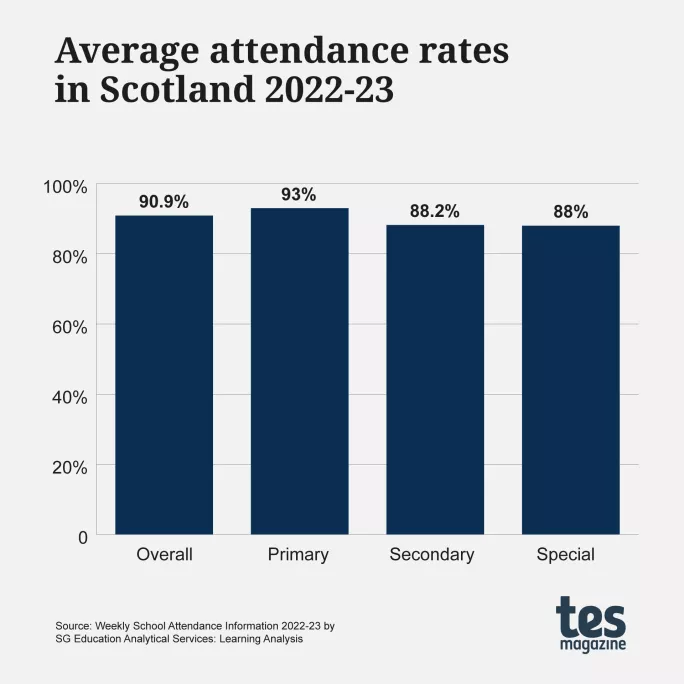Tes Scotland analysis has uncovered school attendance rates that appear to back up concerns that the Covid pandemic has shifted attitudes about the necessity of going to school.
National school attendance stats for 2022-23 are available online, which record attendance on one day for each of 40 weeks.
Although no cumulative or average figures are published here, Tes Scotland has calculated that the average attendance rate across primary, secondary and special state schools was 90.9 per cent.
In primary schools, attendance was at 93 per cent, in secondary schools 88.2 per cent and in special schools 88 per cent.
One expert, however, told Tes Scotland that recording attendance rates as a “snapshot” in the middle of the week may be overestimating attendance. The data for 2022-23 recorded attendance on a Wednesday for 34 of the 40 weeks, and also on four Tuesdays and two Thursdays.
Biennial school attendance statistics - which produced average attendance rates based on daily figures - showed that in 2018-19, the last school year uninterrupted by Covid, attendance across all sectors was 93 per cent overall, 94.5 per cent for primary, 90.7 per cent for secondary and 90.1 per cent for special schools.
Lindsay Paterson, a University of Edinburgh emeritus professor of education policy, said that the 2022-23 approach of only recording school attendance once a week, primarily on Wednesdays, is “crude” and “almost certainly” underestimates absence rates.
He added: ”The more educationally revealing way of reporting absence is not the snapshot of weekly (or daily or yearly) percentages, but the cumulative effect - for example, what percentage of pupils were absent for at least 10 per cent of the time (a day per fortnight)?”
Professor Paterson said that cumulative figures were recorded during the Covid years of 2020-21 and 2021-22, and that it was “concerning...that the cumulative percentages have been dropped”, as “low absence rates in a cross-sectional census can be covering up a lot of cumulative loss of learning”.
Last week, Scott Mulholland, a member of the ADES education directors’ body and South Ayrshire Council’s assistant education director, told the Scottish Parliament’s Education, Children and Young People Committee that “the attitude to school attendance has changed” since pupils had their education disrupted by Covid-19.
He said: “From my own experience, what we have is a number of young people who are not attending school as regularly as we would hope.
“In fact, in our secondary schools in my own area, and speaking to colleagues through the ADES network, we’re seeing this across the country, where young people are regularly taking a four-day week. Or they may be attending school even less frequently than that, so the attitude to school attendance has changed.”
However, Mel Ainscow, a professor of education at the University of Glasgow, said that although attendance had been “influenced by post-Covid pressures”, pupils not showing up for school had been “a problem in Scotland for many years” and that the attendance rate “should certainly be far higher than 90 per cent”.
School attendance has also been much debated in England, with children’s commissioner Dame Rachel de Souza calling for a national campaign on the importance of school.





